- Home
- Julie Smith
Death Before Facebook (Skip Langdon #4) (Skip Langdon Mystery) (The Skip Langdon Series)
Death Before Facebook (Skip Langdon #4) (Skip Langdon Mystery) (The Skip Langdon Series) Read online
Praise for DEATH BEFORE FACEBOOK, the FOURTH book in the Skip Langdon series by EDGAR AWARD-WINNING author Julie Smith
DEATH BEFORE FACEBOOK used to be NEW ORLEANS BEAT
Praise for Julie Smith and NEW ORLEANS BEAT
“If you haven’t discovered Smith yet, now is the time to do so … Move over, Sara Paretsky.”
—KPFA-FM (Berkeley, CA)
“A peek into the sometimes dangerous world of the computer-obsessed, set in the sultry heat of New Orleans and tempered with just the right dose of Southern humor.”
—USA Today
“You can’t help but like Skip Langdon, and Julie Smith does her usual excellent job of capturing the feel of New Orleans.”
—The New Orleans Times-Picayune
The Skip Langdon Series
(in order of publication)
NEW ORLEANS MOURNING
THE AXEMAN’S JAZZ
JAZZ FUNERAL
DEATH BEFORE FACEBOOK (formerly NEW ORLEANS BEAT)
HOUSE OF BLUES
THE KINDNESS OF STRANGERS
CRESCENT CITY CONNECTION (formerly CRESCENT CITY KILL)
82 DESIRE
MEAN WOMAN BLUES
Also by Julie Smith
The Rebecca Schwartz Series
DEATH TURNS A TRICK
THE SOURDOUGH WARS
TOURIST TRAP
DEAD IN THE WATER
OTHER PEOPLE’S SKELETONS
The Paul Macdonald Series
TRUE-LIFE ADVENTURE
HUCKLEBERRY FIEND
The Talba Wallis Series:
LOUISIANA HOTSHOT
LOUISIANA BIGSHOT
LOUISIANA LAMENT
P.I. ON A HOT TIN ROOF
As Well As:
WRITING YOUR WAY: THE GREAT AMERICAN NOVEL TRACK
NEW ORLEANS NOIR (ed.)
DEATH BEFORE FACEBOOK
Formerly NEW ORLEANS BEAT
A Skip Langdon Mystery
BY
JULIE SMITH
booksBnimble Publishing
New Orleans, La.
Death Before Facebook (Originally titled New Orleans Beat)
Copyright 1994 by Julie Smith
Cover by Nevada Barr
ISBN: 9781617507601
Originally published by Ballantine Books, a division of Random House, Inc., New York, and simultaneously in Canada by Random House of Canada Limited, Toronto.
Grateful acknowledgment is made to the following for permission to reprint previously published material:
Henry Holt and Company, Inc.: Excerpt from “The Oven Bird” from The Poetry of Robert Frost, edited by Edward Connery Lathem. Copyright 1944 by Robert Frost. Copyright 1916, © 1969 by Henry Holt and Company, Inc. Reprinted by permission of Henry Holt and Company, Inc.
Llewellyn Publications: Excerpt from The Goddess Sekhmet by Robert Masters. Reprinted by permission of Llewellyn Publications, Box 64383, St. Paul, MN 55164.
Phoenix Publishing, Inc.: Excerpts in Chapter 16 are from Eight Sabbats for Witches and Rites for Birth, Marriage and Death by Janet and Stewart Farrar. Copyright © 1981 by Janet and Stewart Farrar. Reprinted by permission of Phoenix Publishing, Inc.
www.booksbnimble.com
All rights are reserved. No part of this book may be used or reproduced in any manner whatsoever without written permission, except in the case of brief quotations embodied in critical articles and reviews.
First booksBnimble Publishing electronic publication: June 2012
eBook editions by eBooks by Barb for booknook.biz
Author’s Note
I changed the title because I could. I never did like NEW ORLEANS BEAT—that was the publisher’s idea.
But I changed other things too. More about that at the end of the book.
For Hendrika de Vries, who taught me where stories come from.
Contents
Praise
The Skip Langdon Series
Also by Julie Smith
Title Page
Copyright Page
Author’s Note
Dedication
CHAPTER ONE
CHAPTER TWO
CHAPTER THREE
CHAPTER FOUR
CHAPTER FIVE
CHAPTER SIX
CHAPTER SEVEN
CHAPTER EIGHT
CHAPTER NINE
CHAPTER TEN
CHAPTER ELEVEN
CHAPTER TWELVE
CHAPTER THIRTEEN
CHAPTER FOURTEEN
CHAPTER FIFTEEN
CHAPTER SIXTEEN
CHAPTER SEVENTEEN
CHAPTER EIGHTEEN
CHAPTER NINETEEN
CHAPTER TWENTY
CHAPTER TWENTY-ONE
CHAPTER TWENTY-TWO
CHAPTER TWENTY-THREE
CHAPTER TWENTY-FOUR
CHAPTER TWENTY-FIVE
CHAPTER TWENTY-SIX
CHAPTER TWENTY-SEVEN
CHAPTER TWENTY-EIGHT
CHAPTER TWENTY-NINE
CHAPTER THIRTY
Acknowledgments
Author’s Note (continued)
Preview of HOUSE OF BLUES
The Skip Langdon Series
Also by Julie Smith:
Sign Up
About the Author
CHAPTER ONE
PEOPLE HATE New Orleans because it’s hot—certain people, that is, from the sort of bland, tepid climate that spawns good mental health and consuming boredom. In a hot climate, anything can happen. A quiet dinner can ignite. “Bobby,” a wife may say to her husband, “you never fuck me anymore. Bobby, why don’t you fuck me anymore?” Her tone will change here. “Because when you do, you’re soooo good at it.”
Just as the guests are beginning to smell danger, she may say, “He is, isn’t he, Emily? Isn’t he good at it?”
Emily’s husband knows he should do something, but what? Defend his wife? Yet he’s torn—maybe he’s about to find out something he needs to know.
But Bobby says, “Precious lamb, I never fuck you anymore because ever since you went on Jenny Craig you’re such a little bitty thing I can’t even find you in the covers.”
Thrilled, she answers, “You really think it did some good?” and all is well until the next course, when the neighbor from next door, drunk and deciding suddenly to remodel, may pound a hole in the wall.
“Burton,” the host will ask coolly, “what do you want?”
Burton will raise one finger and begin to fall through the new doorway, passing out about fifteen minutes too late to avert disaster. “Ham and cheese on rye,” he will answer, crashing loudly onto the floor. But still, he will open one eye: “Hold the mayo.” And that is the part of the story that makes it worth repeating.
This sort of thing would never happen in Sweden—or even in California—according to Steve Steinman, the great and good friend of New Orleans detective Skip Langdon, and a resident of California himself. Steve claimed to have been at the gathering where the above events occurred, and as a result had formed a theory that the heat of the place causes chemical changes in the brain that loosen the inhibitions. Skip said it was only the alcohol, but he said that and the heat, taken together…
Steve had some quaint notions, Skip thought, and furthermore, he had never been to New Orleans in late fall and winter.
The cold can be piercing. In those magnificent rooms for which the city is celebrated, the ones with the fourteen-foot ceilings, occupants sigh and reach for their thermostats, reflecting that, expensive as heat is, i
t’s nothing compared to air-conditioning. In November, it’s merely crisp—a welcome cold, a refreshing chill, one that won’t last. Those in sweaters today may be in shorts by Thanksgiving—or not, depending.
It was early in the month, the tenth, the first really cool day, and Skip woke up shivering. She was in a new place, one she’d never slept in in winter—it was the slave quarters behind her old apartment building, which had been restored to its original status as a single-family house and was now inhabited by her landlord, Jimmy Dee Scoggin, and the two children he’d acquired when his sister died.
Jimmy Dee had gutted the slave quarters and turned it into as posh a showplace as the Quarter had to offer when he’d lived there himself. But it now had a new name. His adopted children were from Minneapolis and hadn’t grown up with the city’s brutal history. Determined to protect their innocence, he insisted upon calling the outbuilding a garconnière. “In the old days,” he told them, “they had special houses just for the boys,” which prompted eleven-year-old Kenny to ask why he couldn’t have it instead of Auntie.
“Because,” answered Skip, “now that I’m there it’s going to take an earthquake to get me out.” She had four times as much room as in the studio she’d rented before, ten times the luxury—and about twenty times the open space, as her three or four sticks of furniture didn’t really make a dent. She thought it was a mansion and she was as close to happy as she’d ever been in her life. But what she didn’t have, she was discovering, was central heating.
She called Jimmy Dee.
“Make a fire, darling, a fire. So romantic, don’t you know.”
“Dee-Dee, it’s seven-thirty A.M. I’m going to work.”
“Well, then, what’s the problem? I’ve oatmeal to make if you don’t mind.” In the background she heard a chorus of “Ick, oatmeal!”
Fatherhood was proving a little more than Jimmy Dee expected.
Skip dug out a black wool skirt and cocoa sweater, dressed, and hoped the day didn’t warm up. Somewhere she found a brown blazer that “pulled the outfit together,” as her friend Alison put it. She didn’t get it, but she had to admit it looked better than something she’d have picked herself—probably something red, singularly inappropriate for a homicide detective.
She was at her desk, drinking her second cup of inky coffee, when her sergeant, Sylvia Cappello, handed her a day record from the coroner’s office, along with its autopsy report.
“Take a look. I just talked to the coroner about this.”
It was an “unclassified,” or suspicious, death. A thirty-one-year-old, healthy white male had been found dead after an apparent fall from a ladder.
Cappello said, “Notice it says he fractured his ankle and his skull? Pretty unlikely, apparently. You’d either land on your feet or your head, not both.”
“I can see that.”
“But if you landed on your feet, broke your ankle, and you were too badly hurt to move, somebody could come along and bang your head against the concrete pretty easily.”
“Surely someone from Homicide went out on it.”
“Lasko and Drumm. But it looked like an accident and they thought that was how it should be classified.” She handed Skip the brief report they’d done. “And now they’re up to their eyebrows with that triple shooting in the Magnolia Project.”
“It happened Thursday.” Skip sighed. “And today’s Monday. I hate to think about the crime scene.”
“Well, what the heck—what else have you got to do?”
A macabre joke that drew a snort from Skip. The city’s homicide rate was sky-high and climbing.
“Thirty-one’s too young to die.”
“But too old to live with your parents.”
Yet Geoffrey Kavanagh, the victim, had lived with his, in a rambling old house on Octavia Street. From the outside, it looked like the sort of place the neighborhood kids would call “the haunted house”—the one with its yard overgrown, the one that hadn’t been painted in a couple of decades. The occupants must not be particularly friendly people, must not want much contact with the outside world, to live behind such an urban forest. Skip approached with trepidation.
Inside the house, a dog barked. What sort of people were like that? Antisocial people by definition. Crazy people, probably. Neglectful people.
Depressed people.
Alcoholics.
But as she entered the jungle, she saw that there was a certain pattern to its wildness, an artfulness, a cultivation of the inherent drama of the thing. Deadwood had been cleared and so had paths; leaves had been raked—in fact, the jungle was an illusion, only a tangle at the front of the yard. Past that was a neatly mowed lawn and some beautifully tended beds. Three or four sleek cats sunned themselves in what patches of light they could find. Those who lived here weren’t neglectful, despite the desperate paint situation.
Just as Skip had decided that, a woman who belied it answered the door. She wore baggy, faded sweats. Her face was drawn, without makeup, her cheeks sunken, the half-moons under her eyes purplish. Her hair was drawn back in a loose ponytail, but it lacked body and shine. She could have been sixty, judging by her ravaged face, but her hair was black; she had some fight left in her.
“Mrs. Kavanagh?”
“Terry. Marguerite Terry.”
Skip identified herself. “I wonder if I could ask you some questions about your son?”
Immediately, her eyes filled. “My son? But he’s… I don’t understand.”
“About his death.”
She seemed relieved. “I’m sorry. I guess I’m still half asleep; I’ve been sleeping so much.”
Skip nodded slightly but said nothing, hoping Marguerite Terry would remember her manners, but she only looked expectant. At her heels, a white dog with brown ears wagged its tail in a vague sort of way. “I wonder if I could come in?”
“Oh. Of course.” She glanced at the dog. “Okay, Toots?’ The dog gave another vague wave, apparently acquiescing.
Skip stepped into a room as gloomy as is appropriate in a house where there’s been a death. The curtains were drawn, making it cave-like. Newspapers were piled on the floor, as if no one could be bothered to remove them. There was a glass or two on a coffee table and a rumpled blanket on the couch; otherwise the room was dusty and looked seldom used. The rug was threadbare and the floor was bare wood, its finish long since worn away. The upholstery was frayed. The ancient wallpaper had never been replaced.
Yet once someone had cared; there were good quality pieces here, a look of severely reduced circumstances, poverty that might be genteel if anyone could be bothered to vacuum and dust. Skip was back to neglectful.
Obviously embarrassed, Marguerite opened the heavy, dusty drapes. They looked as if they’d been chosen forty years ago and hadn’t been disturbed since, had simply hung here collecting dust, outlasting the fashions of nearly half a century, creating a pall of gloom.
The room was better with a little light.
“We don’t spend much time in here,” said Marguerite. “Everybody’s so busy.”
“Everybody?”
“My husband, Coleman, a self-described and self-taught computer nerd, as he likes to say. He has his office here, but he’s off at a meeting today. And Neetsie, our daughter. Well, she moved out a while ago—she has a studio of her own, can you imagine? Eighteen years old. And Geoff”—her voice caught—“I was so used to him. You know how you get used to a person?”
Skip thought it an odd thing to say about a son.
“Like a dog or something, I don’t know. Won’t you sit down?”
“Actually, I’d like to see where the accident happened if I could, please.”
“You want to see—” She stared, as if trying to understand.
“Where you found him,” Skip finished. “I’m sorry. I know this must be hard.”
“Oh,” said Marguerite, and Skip thought she meant not so much that it was hard as that she understood. “Come through here.”
&nbs
p; The dog at her heels, she led Skip through a dining room as drab as the living room, as dark and dusty, but clearly used—if only as a catchall. The table was piled high with stacks of mail, more old newspapers, magazines, the sort of everyday debris that accumulates somewhere in every house—but that usually gets cleaned up every few days. This looked like months’ worth. They went through a kitchen that seemed more lived in, was quite messy, in fact, in a homey sort of way, and finally through a mudroom. Three steps led down to a flagstone patio. “Up there,” said Marguerite. “That’s where Mosey was.”
“I beg your pardon?”
“You don’t know what happened?’
“I just know your son fell from a ladder.”
“Well, I woke up about ten o’clock and when I came in the kitchen I heard the most piteous meowing. So I went out and there was Geoff, lying on the patio with the ladder on top of him. Mosey, our little gray cat, had gotten up on the roof and Geoff fell trying to get him down.” She paused, remembering, her face drawing tight as she fought to control it. “It was like a story that told itself with one glance.”
“What was he wearing?”
“A T-shirt and a pair of old sweats, as if he’d gotten out of bed and thrown something on to come outside. No shoes. His feet—”

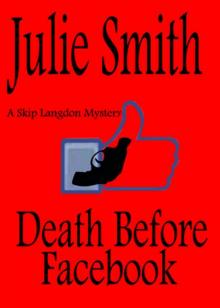 Death Before Facebook (Skip Langdon #4) (Skip Langdon Mystery) (The Skip Langdon Series)
Death Before Facebook (Skip Langdon #4) (Skip Langdon Mystery) (The Skip Langdon Series) P.I. On A Hot Tin Roof
P.I. On A Hot Tin Roof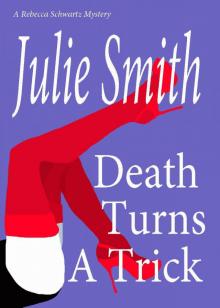 Death Turns A Trick (Rebecca Schwartz #1) (A Rebecca Schwartz Mystery) (The Rebecca Schwartz Series)
Death Turns A Trick (Rebecca Schwartz #1) (A Rebecca Schwartz Mystery) (The Rebecca Schwartz Series) The Axeman's Jazz (Skip Langdon Mystery Series #2) (The Skip Langdon Series)
The Axeman's Jazz (Skip Langdon Mystery Series #2) (The Skip Langdon Series)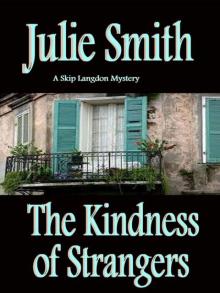 The Kindness of Strangers (Skip Langdon Mystery #6) (The Skip Langdon Series)
The Kindness of Strangers (Skip Langdon Mystery #6) (The Skip Langdon Series) Louisiana Hotshot
Louisiana Hotshot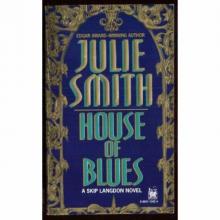 House of Blues
House of Blues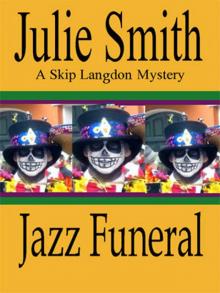 Jazz Funeral (Skip Langdon #3) (Skip Langdon Mystery) (The Skip Langdon Series)
Jazz Funeral (Skip Langdon #3) (Skip Langdon Mystery) (The Skip Langdon Series) Tourist Trap (Rebecca Schwartz #3) (A Rebecca Schwartz Mystery) (The Rebecca Schwartz Series)
Tourist Trap (Rebecca Schwartz #3) (A Rebecca Schwartz Mystery) (The Rebecca Schwartz Series) Louisiana Bigshot
Louisiana Bigshot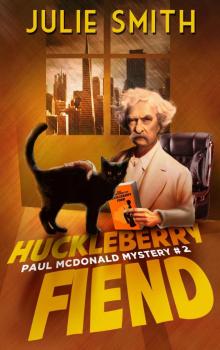 Huckleberry Fiend
Huckleberry Fiend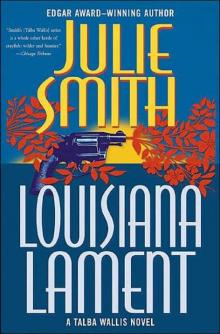 Louisiana Lament
Louisiana Lament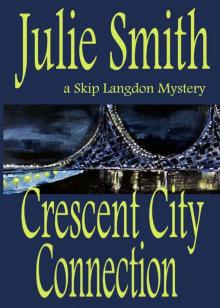 Crescent City Connection (Skip Langdon Mystery #7) (The Skip Langdon Series)
Crescent City Connection (Skip Langdon Mystery #7) (The Skip Langdon Series)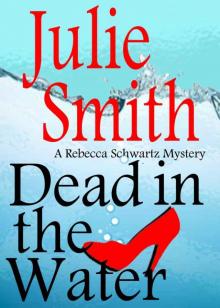 Dead In The Water (Rebecca Schwartz Mystery #4) (The Rebecca Schwartz Series)
Dead In The Water (Rebecca Schwartz Mystery #4) (The Rebecca Schwartz Series)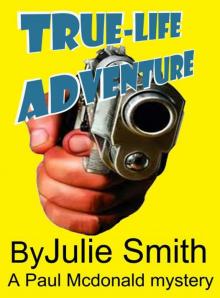 True-Life Adventure
True-Life Adventure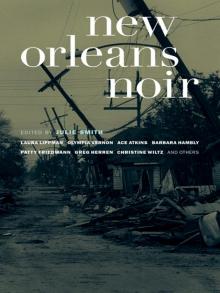 New Orleans Noir
New Orleans Noir